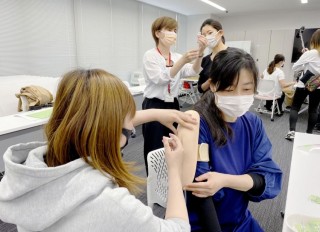Loading
Search
▼ Hurdles Remain To Getting Ex-Nurses Involved In Vaccine Rollout
- Category:Other
Expectations are high that licensed nurses currently not employed at medical facilities can help speed up Japan's coronavirus vaccination rollout, but obstacles including inflexible working hours lie in the way.
"I could help if I were able to give shots at a local clinic in the mornings," said a 38-year-old woman in Suita in Osaka Prefecture, who worked as a nurse at a hospital before quitting six years ago after becoming pregnant.
The woman, who feels frustrated every time she sees a media report about the shortage of personnel to administer vaccines, is now looking for a job on the condition that she only works while her child is attending preschool.
She also wants to work at a clinic rather than a group vaccination site due to fear of being infected by the virus, but so far has been unable to find a job that meets her requirements.
A dearth of doctors and nurses to administer shots is one of the factors behind Japan's slow inoculation rollout, which lags far behind other developed countries.
The government has added dentists and trainee doctors to the list of medical professionals authorized to give jabs and is exploring other possibilities including former nurses and paramedics.
As of 2010, there were some 710,000 qualified nurses under 65 years old who were not employed at medical facilities in the country, according to the Ministry of Health, Labor and Welfare.
Another former nurse, a 30-year-old woman in Akishima in Tokyo, has also looked for work after quitting four years ago due to marriage and a change of residence.
She found a job offer locally for administrating coronavirus vaccines but gave up on applying because she could not find somewhere to look after her child while she works.
"I was interested but the timing did not match," she said.
According to a March online survey conducted by a recruiting firm on 1,545 unemployed licensed nurses aged 21 to 54, 63.5 percent of them were positive about joining the country's vaccination campaigns.
Of the respondents, 18.6 percent said they would apply for a job to administer vaccines and 44.9 percent said they would consider applying depending on what they were expected to do and the working conditions.
In the survey by DIP Corp, the operator of recruiting portal site Baitoru, 36.5 percent said they were not interested in being part of the inoculation drive.
Some respondents asked about the risk of infection and whether there are measures in place to deal with emergencies such as serious adverse reactions among vaccine recipients.
Others wanted to know whether the job was only temporary or come with long-term prospects, according to the survey.
In analyzing the survey results, DIP said while many respondents are looking to work shorter hours, employers are reluctant to recruit part-time nurses because it involves more work in training and assigning them duties.
"We hope to support diverse working styles so that those with (nursing) licenses can use their expertise," a DIP official said.
© KYODO
- June 12, 2021
- Comment (0)
- Trackback(0)


